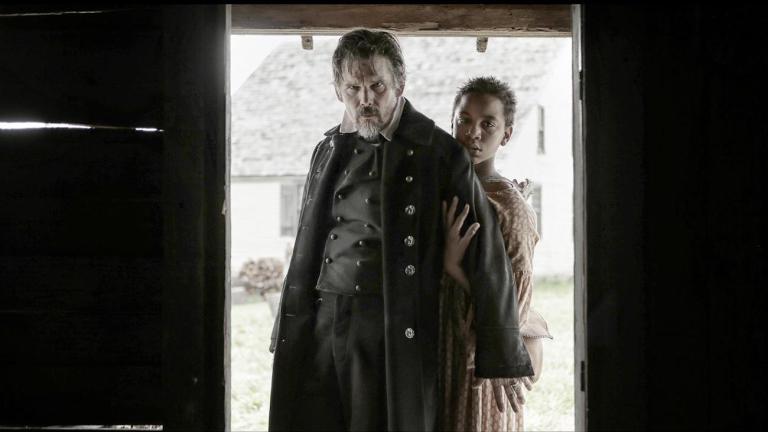Ethan Hawke and Daveed Diggs’ John Brown TV Series Gets Epic Trailer
Showtime’s The Good Lord Bird gets its first trailer with Ethan Hawke as gun-wielding abolitionist John Brown and Daveed Diggs as Frederick Douglass.

Sing it with me: “John Brown’s body lies a-moldering in the grave, John Brown’s body lies a-moldering in the grave, John Brown’s body lies a-moldering in the grave, but his soul is marching on!” These were the opening words of the Union’s favorite marching tune during the American Civil War, and a macabre tribute to the abolitionist whose bloody raid against slaveholders in Virginia is considered one of the flashpoints that led to the war. Somehow the new trailer for the Showtime series, The Good Lord Bird, looks just as fittingly extreme in its approach.
The show, which stars Ethan Hawke as Old John Brown and Daveed Diggs as an exceedingly virile Frederick Douglass, is a new limited series from the premium cable network and Jason Blum’s Blumhouse Productions. The series is also a clear passion project for Hawke, who in addition to starring and executive producing the series is also the show’s creator. Personally adapting the show from James McBride’s historical novel based on Brown’s life, Hawke is spearheading the project about one of the most famous firebrands in American history—a man who is still called a hero by some and a terrorist by others.
Like the book of the same name, which won the National Book Award in 2013, The Good Lord Bird focuses on Brown (Hawke) and the friendship he strikes up with a fictional character of Onion (Joshua Caleb Johnson-Lionel), an enslaved boy who was freed when Brown attacked pro-slavery settlers in 1856 Kansas. From there Onion is the point-of-view into Brown’s forceful approach to ending slavery by gunpoint—culminating with the raid on Harpers Ferry where Brown and his supporters met a grim fate.
The talent involved makes this instantly a fascinating project. Hawke of course is a well-known film star, but he’s also one of the more underrated screenwriters of his generation. In addition to penning 2018’s Blaze, he also co-wrote the last two films of the Before Sunrise trilogy with director Richard Linklater and co-star Julie Delpy. Additionally, the subject of John Brown, and an American public so acrimoniously divided that bullets start being traded, feels more vital than ever these days. Diggs, who is also making his small screen debut in Snowpiercer later this year, is likewise no stranger to American history considering he played Thomas Jefferson and Gilbert du Motier, Marquis de Lafayette, in the original Broadway production of Hamilton.
The real historic Brown was a farmer who preached for years the need for armed insurrection to overthrow the institution of slavery. However, he did not rise to national prominence until he responded to the sacking of anti-slavery Lawrence, Kansas by a pro-slavery mob. That 1856 attack triggered a series of skirmishes in the Kansas Territory that became known as the “Bleeding of Kansas.” One such event was Brown leading a group of abolitionists to attack and kill five slavery advocates outside Pottawatomie Creek. It became known in Southern newspapers at the “Pottawatomie Massacre.”
But it was the Harpers Ferry raid of 1859, in which Brown and his supporters attacked a federal armory to arm freed slaves in the hopes of beginning a slave revolution that would spread across the state and into North Carolina, that earned Brown his Union song. Granted that’s because his revolt failed and he was tried for treason against the Commonwealth of Virginia and executed—making him the first convicted “traitor” in American history—but the South’s anger over the incident and some Northern abolitionists’ praise of it heightened the tension going into the 1860 presidential election that brought Abraham Lincoln to the White House and an embittered collection of Southern states into armed rebellion.
For the record, the song “John Brown’s Body” became an American classic when the words were modified for the “Battle Hymn of the Republic,” or as you might know it, “Glory, Glory, Hallelujah.”
